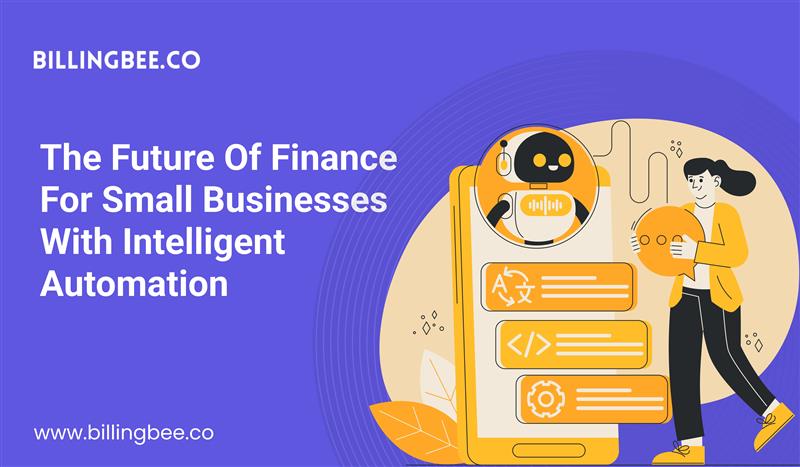The Future of Finance for Small Businesses with Intelligent Automation




Running a small business in today’s digital-first economy is no easy task. With limited resources, fluctuating cash flow, and the constant demand for efficiency, owners are seeking tools that can save time, reduce errors, and give them insights into their finances. Intelligent automation has quietly become the game-changer behind this transformation, bringing the kind of support that was once only available to larger corporations.
This shift is not just about replacing manual invoicing with digital alternatives—it’s about reimagining the entire financial workflow. From generating invoices to predicting payment delays, technology is stepping in to simplify tasks that were once time-consuming and prone to human error. The future of small business finance is no longer about survival—it’s about building smarter, data-driven systems that empower entrepreneurs to thrive.
Why Intelligent Automation Matters for Small Businesses
Traditionally, financial management for small enterprises meant spreadsheets, manual calculations, and a constant struggle to keep books balanced. This approach was slow, stressful, and left too much room for mistakes. Intelligent automation brings three critical advantages:
- Time-Saving Efficiency – Tasks that once took hours, such as creating recurring invoices or tracking overdue payments, now take minutes.
- Error Reduction – Automated systems minimize human error, ensuring greater accuracy in billing and reporting.
- Data-Driven Decisions – With real-time insights into revenue, expenses, and client payment behaviors, business owners can make smarter financial decisions.
For small businesses, where every minute and dollar counts, these benefits can be the difference between stagnation and growth.
From Reactive to Predictive Finance
One of the biggest shifts happening in business finance is the move from reactive accounting to predictive financial management. Instead of waiting until the end of the month to discover payment issues or cash flow shortages, small businesses can now anticipate problems before they occur.
Imagine a system that doesn’t just record a late payment but warns you that a specific client is likely to delay again based on their history. Or a tool that automatically adjusts invoice reminders based on a client’s behavior. This is the new reality—finance that doesn’t just keep up with your business but actively guides it forward.
Digital Invoicing as a Growth Enabler
Digital invoicing has evolved beyond sending bills via email. It now integrates seamlessly with payment gateways, accounting tools, and business dashboards. This connectivity makes the process faster for businesses and more convenient for clients.
Here’s how it helps small businesses scale:
- Faster Payments – With online payment links directly embedded into invoices, clients pay quicker.
- Global Reach – Businesses can now serve clients across borders without worrying about currency conversions or complex tax rules.
- Professional Image – Automated, branded invoices reflect professionalism, boosting credibility with customers.
By eliminating friction in the payment process, businesses improve cash flow—arguably the single most important factor in their survival and growth.
Humanizing Finance with Technology
While automation may sound like it removes the human element, in reality, it does the opposite. By handling repetitive, low-value tasks, it frees entrepreneurs and finance teams to focus on what truly matters—relationships, strategy, and growth.
For example, rather than spending hours chasing invoices, business owners can use insights from their billing system to negotiate better terms with clients or plan new service offerings. In this way, intelligent automation doesn’t just make finance easier; it makes business more human.
Global Trends Shaping the Future
Small businesses everywhere are experiencing similar pressures: inflation, changing tax regulations, and increased competition. Intelligent automation responds to these challenges by:
- Supporting Remote Work – Cloud-based billing tools let business owners access their finances from anywhere.
- Simplifying Compliance – Automated tax calculations help companies stay compliant across different regions.
- Offering Scalability – Businesses can expand without worrying about whether their billing systems can keep up.
Global adoption is accelerating because these tools are not just convenient—they’re essential for staying competitive in a connected world.
Why Now is the Time to Adapt
Small businesses that embrace digital transformation in their financial workflows position themselves for long-term success. Those that don’t risk falling behind competitors who can move faster, adapt quicker, and manage money more intelligently.
The future of finance isn’t a distant concept—it’s already here. Entrepreneurs who adopt smarter tools today will find themselves with more time, more accuracy, and more control tomorrow.
Conclusion
The role of intelligent automation in finance goes far beyond simple digital invoices. It’s about creating a financial ecosystem that learns, adapts, and grows with your business. For small enterprises, this evolution marks the shift from struggling with money management to mastering it.
The businesses of the future will not just work harder—they’ll work smarter. And with tools that bring precision, speed, and insight, small business owners can finally focus less on chasing payments and more on building lasting success